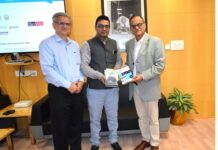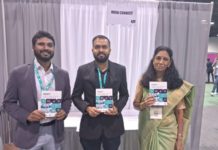
New Delhi: Addressing the inaugural session at the two-day International Symposium on Medicinal and Aromatic plants of India recently, the Union Minister of State (Independent Charge) for Development of North Eastern Region (DoNER), Dr Jitendra Singh said that lifestyle diseases like Diabetes Mellitus Type 2 require holistic management and with more than 65 percent to 70 percent of India’s population today being less than 40 years of age, Diabetes and heart attack in young are going to be the main challenges ahead, because these tend to affect the youth potential which is imperative in the task of nation-building.
Dr Jitendra Singh referred to the change of disease spectrum of India over the last few decades and said that India today has evolved from an era of communicable diseases into an era of non-communicable diseases like Diabetes Mellitus, heart attack, lipid disorders, hypertension and other metabolic diseases. Even though a number of new remedies and medicinal options are available for the treatment of these diseases, he said, the basic Mantra is still based on lifestyle modifications and natural methods, and for this purpose, the various Indian medicine regimens incorporated in Naturopathy, Yoga and other indigenous therapies find a contributory role, he added.
“Under the leadership of the Prime Minister, Narendra Modi,” Dr Jitendra Singh said, “in the last two years, not only the holistic medicine and the indigenous therapies have been accorded priority but have also been given a place of respectability.” He said that the Prime Minister Modi decided to establish the first ever independent Ministry of AYUSH in the Government of India after nearly 70 years of independence.
India is the fountain- head and original birth-place of all the aromatic and medicinal plants, said Dr Jitendra Singh and regretted that in the last few decades, most of the research on the Indian medicinal plants was conducted in other countries and not in India. To that extent, he said, the Central Government has tried to vindicate the lapse of the earlier decades.
While emphasizing on indigenous research based on Indian conditions, Dr Jitendra Singh also called for change of mindset, so that those who choose to become practitioners of Indian medicine, should do so by aptitude and interest.
Dr Jitendra Singh said that the North East region of India has huge potential for the organic products which have huge health benefits. This unexplored potential needs to be explored, he added. He also said that Government is giving priority to tap this potential of the North East region as well as placing high priority on the health status of the citizens. This will be helpful in tapping the natural organic resources for the health benefit of the citizens, he added.
MoS Agriculture, Mr Parshottam Rupala, while speaking on the occasion said that the Ministry of Agriculture will evolve a more comprehensive plan to promote medicinal plants and herbs and will also try to take the experts on board.
Member of Parliament, Mr Manoj Tiwari, MLA of Delhi, Mr O P Sharma and Secretary, Ministry of AYUSH, Mr Ajit Sharan were also present on the occasion.

































































